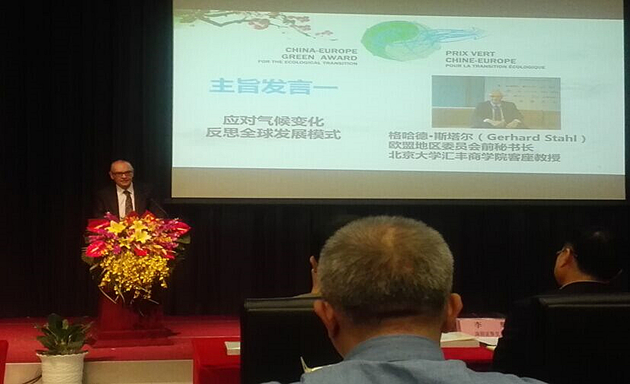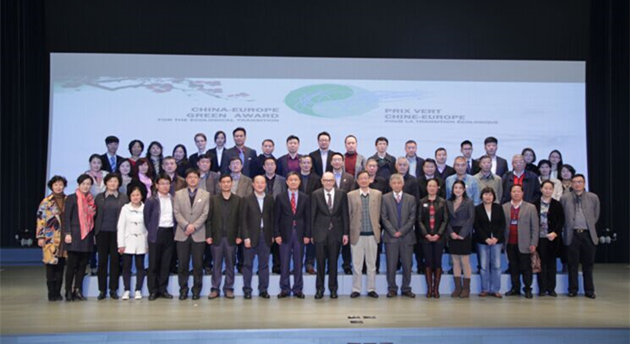Last week, Conference on Ecological Civilization and Green Transformation was held in Shenzhen Stock Exchange Building. Prof. Gerhard Stahl, former secretary general of the EU Committee of the Regions, visiting professor at the Peking University PHBS Business School was invited to give a keynote speech and attend award ceremony for Champion Foundations in Ecological Transition. Following are his remarks, which focus on rethinking our global development model in face of climate change.
 Prof. Gerhard Stahl is delivering a keynote speech "Facing Climate Change: Rethinking Our Global Development Model"
Prof. Gerhard Stahl is delivering a keynote speech "Facing Climate Change: Rethinking Our Global Development Model"
Ladies and Gentlemen!
I want to thank the organizers for this timely seminar and Award ceremony on ecological civilization and green transformation. Three months after the United Nations framework convention on climate change (COP 21) in Paris, there is a need to discuss the next steps of green transformation. It is a very good idea to have such a discussion here in Shenzhen, a frontrunner of green development in China. At the 30.November, with the speech of the Chinese President in Paris, it became clear that China would become a strong partner for the needed ecological transformation.
The degradation of our environment and the negative consequences of climate change is an existential threat for the future development of humankind on our planet.
Already since some years scientific reports showed that our climate system is moving beyond the patterns of natural variability, within which our society and economy have developed. We have to fear an irreversible climatic shift, with all its negative consequences: Increase of the global mean surface temperature, Ice sheet melting, Sea-level rise, Deforestation, Extreme climatic events and devastating natural catastrophes.
In short a degradation if not destruction of our natural environment. Therefore urgent measures are needed to stop global warming.
For a long time important economic and political actors were reluctant to address these challenges. The short term needs of economic growth and development where regarded as the clear priority. Such a priority setting can be well understood for developing countries. Where there is mass-poverty and the fight for daily survival the ecological development and the climate will be secondary. But there have been also mayor economic interests in rich developed countries that denied a shift to a more sustainable policy. In the UN conferences in Kyoto in 1992 and later in Copenhagen (COP15) in 2009, the United States, having one of the highest co2 emissions per capita, was not yet prepared to support a common policy together with European Countries to fight global warming and to develop a more sustainable economic model. Having been part of the official EU-delegation in Copenhagen, I still remember our disappointment about the American position and the failure of the Conference.
The recognition in China of the need for green economy and the very proactive diplomacy of the Chinese President in the preparation of Paris, discussing climate policy directly with President Obama, helped to change the American position. In Paris the Chinese president, the American president and the European leaders all stood on the same side.
But we should have no illusions: The success of Paris was not the end but only the beginning of a transformation process. To achieve a low carbon economy needs concrete sometimes-painful actions. The Paris objective to limit global warming to 1.5 degree Celsius demands a policy change towards green economy in developed and developing countries. China with its understanding of the needs of developing countries and its tradition of south-south cooperation can play a very important role as bridge between the developed and the developing world. But most important: China can show how the development of the most populated country in the world can be achieved in a more sustainable manner. That ecological civilization is the model for the future.
But there is still a lot to do. Based on current planning China will achieve the peak of its CO2 emissions in 2030. This is still a long time. Efforts must be made to advance this deadline. Additional measures should be taken in areas such as energy saving, improving energy efficiency, develop non fossil energy, limit the use of coal and develop clean coal technologies and large scale forestation. For the un-going rapid urbanization process in China low carbon cities must be built. The national carbon emission trading system must be put in place quickly. The legislator can benefit from the experiences of some of the pilot projects in China and from the European experience with its European wide emission trading system. This system exists since 10 years. It is by far the biggest international trading system covering 11000 power stations and industrial plants in 31 countries as well as airlines.
We know that in climate policy good political intentions and even good environmental legislation is not enough, if people, business and local authorities do not translate these ideas and rules into the daily live. Implementation of green economy and concrete actions are the key to success. As former Secretary General of the Comity of the Regions in the EU, I would like to underline the crucial role of the local level in green transformation. In Europe, cities did not wait for international agreements or even for their national governments to advance in the green transformation. After the failure of Copenhagen, cities and regions in Europe took the initiative. More than 3000 cities and regions all over Europe signed an agreement to take measures to reduce CO2 emissions by 20 % until 2020. All prepared a sustainable Energy Action Plan; they accepted regular evaluation and monitoring. They took the commitment to present regular implementation reports.
How much can be done, how creative actions can be, we will also see today. The foundations present at this conference show with their projects that a lot of the work for a green revolution has already started.
I thank you for your attention.
 A group photo of the attendees after the conference
A group photo of the attendees after the conference





 A group photo of the attendees after the conference
A group photo of the attendees after the conference








